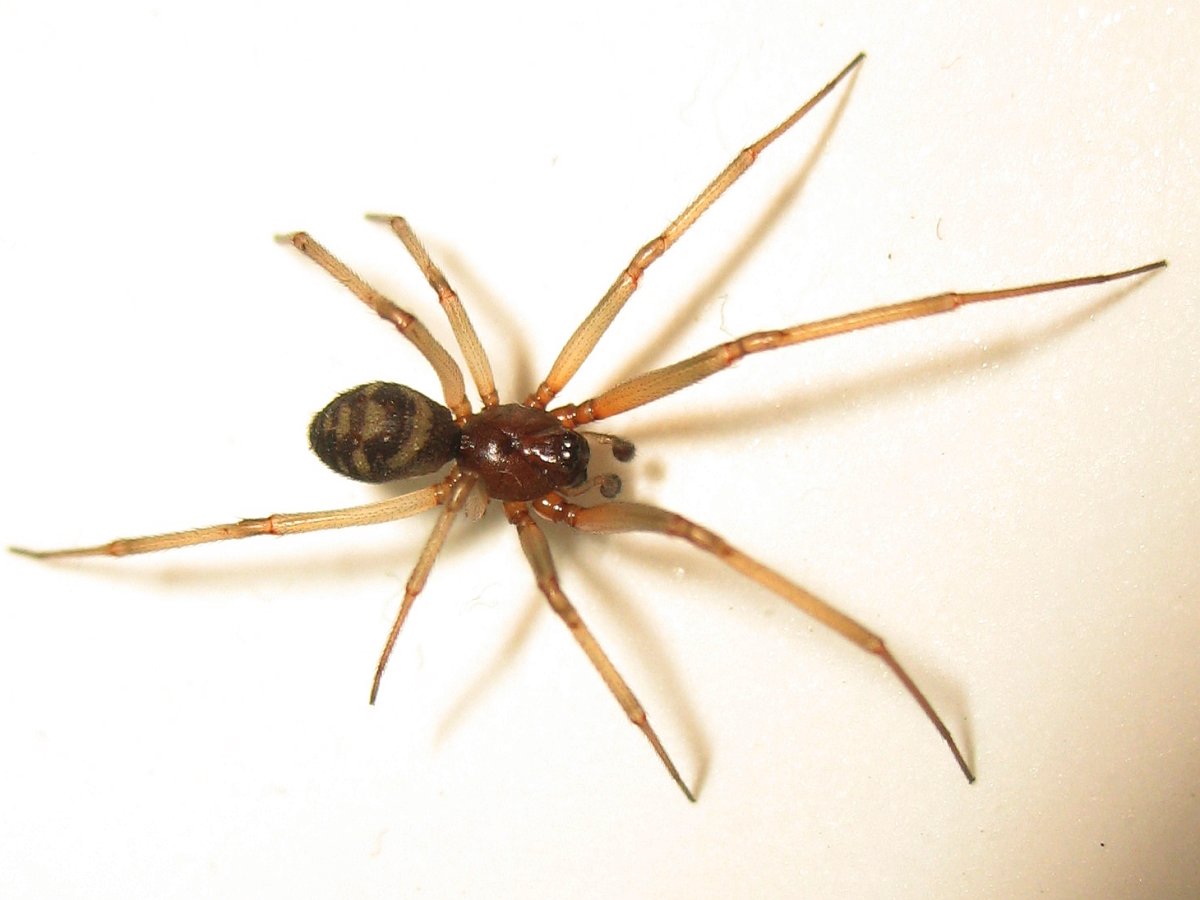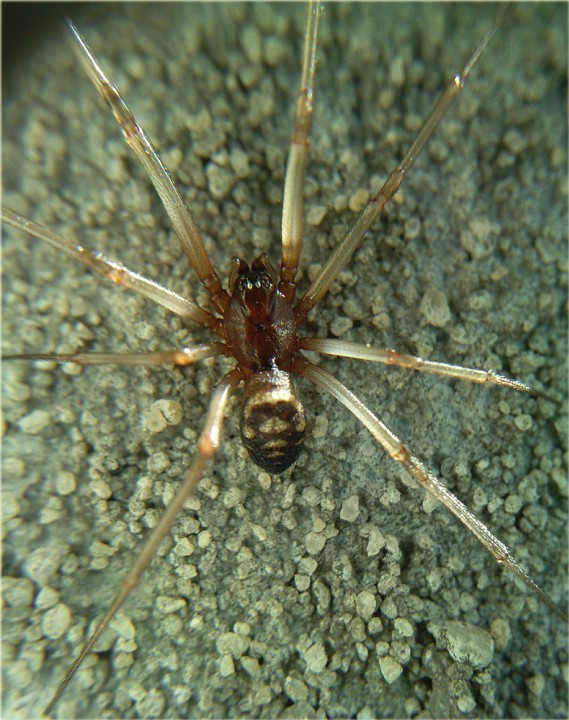
Male Steatoda grossa (False Black Widow) in San Jose , California
Life History These spiders mate in the spring, and the females can produce three or more egg sacs, or cocoons, from May through July. Each sac can contain 200 or more cream-colored eggs. Although the males can live for up to 18 months, they die shortly after mating.

Male Steatoda grossa (False Black Widow) in Flevoland, Netherlands
Size and appearance Female 8.5-14 mm Male: 7-10 mm Always larger than S. bipunctata and usually larger than S. grossa. Their abdomen pattern is often described as 'skull-shaped' but is more like a pentagon - it is clearer in males and dimmer or sometimes absent in females. Their legs are uniformly red to brown.

a spider sitting on top of a piece of paper
Eye arrangement (male): Range Imported from Europe; In North America it has now been found in states along the east and west coasts as well as those bordering the Great Lakes. Specimens have also been collected in Colorado. It's also considered a cosmopolitan species and is found in other countries all over the world. Habitat

Male Steatoda grossa (False Black Widow) in Kilkenny , Ireland
Pictures (157) Taxonomic Hierarchy Kingdom: Animalia Phylum: Arthropoda Class: Arachnida Order: Araneae Suborder: Araneomorphae Family: Theridiidae Genus: Steatoda Species: Steatoda grossa Common Name (AAS) False Black Widow Other Common Names

Male Steatoda grossa (False Black Widow) in Seattle Magnolia
Steatoda, commonly known as False Widows, is a genus of spiders in the family Theridiidae. Steatoda spiders have been sighted 755 times by contributing members. Based on collected data, the geographic range for Steatoda includes 31 countries and 46 states in the United States. Steatoda is most often sighted indoors, and during the month of April.

Male Steatoda grossa (False Black Widow) in Surrey, United Kingdom
Steatoda grossa was constantly reared at 22 ± 2 °C with a 16:8 h light:dark photoperiod regime. Male and female spiders are shown in Fig. 1 A-D. Approximately 10 adult spiders of both sexes were originally collected at various locations in the area of Wageningen, the Netherlands, late in 2019 and early in 2020 and kept in Petri dishes (8 cm).

Male Steatoda grossa (False Black Widow) in Virginia Beach, Virginia
Physical Description and Identification Are Steatoda Spiders Venomous? Can Steatoda Spiders Bite? Ecological Importance and Behavior of Steatoda Spider Quick Facts Did You Know Scientific Classification Family: Theridiidae Genus: Steatoda Spiders Belonging to this Genus Steatoda adumbrata Steatoda aethiopica Steatoda alamosa Steatoda alboclathrata

(Steatoda grossa) EcoRegistros
Scientific name: Steatoda nobilis False widow spiders are often the subject of unflattering headlines, but in reality they're unlikely to bite humans. Species information Category Spiders Statistics Size: usually up to 14mm (10mm in males) body length, with a leg span that covers a fifty pence piece. When to see

spider Male Steatoda Grossa Jeffry Flickr
It is the largest of the UK's three most common false widow species, reaching a body length of between seven and 14 millimetres, with the females typically larger than the males. The noble false widow was first recorded in the UK in the 1870s - likely a stowaway on cargo ships from its native Madeira and Canary Islands.

Steatoda grossa Mâle
Size The female false black widow normally has a body size of 0.25-0.40 inches (6-10 mm). Their total leg span is about 1 inch (25 mm). The male is slightly smaller and has an oblong abdomen. The male false widow spider looks very different from the female and has a long abdomen. Photo: Flickr Web

Male Steatoda grossa (False Black Widow) in Santee , California United
The image on the left is S. grossa (in my opinion) with a highly developed pattern. The image on the right is what it is. Note the difference in the palps, along with the coloration and pattern. The funny thing is the misplaced image (of the adult male grossa) has an image of an adult male triangulosa on each side of it (see triangulosa images).

Male Steatoda grossa (False Black Widow) in Aberdeen, Washington United
Quick Facts Did You Know Scientific Classification Family: Theridiidae Genus: Steatoda Scientific name: Steatoda grossa Physical Description and Identification Adults Size: Females are typically larger than males, measuring up to 15 mm, while the males usually do not exceed 10 mm.

Male Steatoda grossa (False Black Widow) in Los Angeles, California
Description Like black widows, the female S. grossa is 6-10.5 mm in length and dark colored with a round, bulbous abdomen. Typical coloration ranges from purplish brown to black, with light-colored markings.

Male Steatoda grossa (False Black Widow) in Lauceston, Tasmania, Australia
1 Summary 2 Steatoda grossa, commonly known as the cupboard spider, the dark comb-footed spider, the brown house spider (in Australia), or the false black widow (though several other species are known by these names), is a common species of spider in the genus Steatoda . Description 3

Male Steatoda grossa (False Black Widow) in Los Angeles, California
False Widow Spider - Steatoda grossa - Fort Bragg, Cumberland County, North Carolina, USA March 12, 2005. Bad focus, but honestly I was a bit nervous. I am wondering if this could be a young black widow.. Last night I removed a small (8mm) all black spider that looked exactly like a male black widow spider from the eaves of the attic closet.

Picture Steatoda grossa Male Dorsal View
Classification. Class Arachnida. Order Araneae. Family Theridiidae. The False widow spiders (Steatoda spp.) form a group of species that, because of their general resemblance to the much more notorious Black widow spiders (Latrodectus spp.), can cause concern when found in Britain.In fact, these False widow spiders and the true Black widow spiders belong to the same family, the Theridiidae.